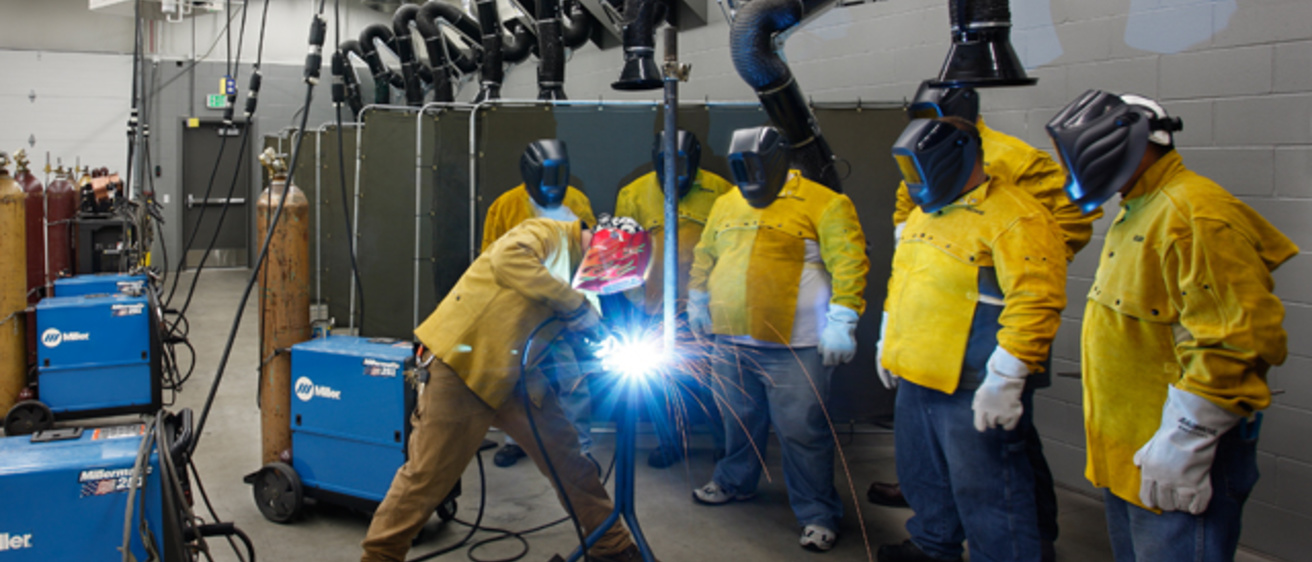The University of Iowa and Kirkwood Community College have collaborated for years through such programs as 2-Plus-2 to help Iowa students bridge the gap between two-year and four-year college degree programs, making higher education more accessible and affordable.
But the education and employment landscape is changing, and there’s growing concern about the competitiveness of high school and college graduates for jobs in mathematics and the sciences. So last year the two schools began discussing what more they could do to leverage Kirkwood’s strength and agility in technical education and training and the UI’s commitment to high-level teacher training and its strengths in science, technology, engineering, and mathematics (STEM) in research and graduate education.
The result is two new initiatives that will directly benefit students and workers in the recently branded Iowa’s Creative Corridor, the region encompassing Iowa City and Cedar Rapids. First they will create a Kirkwood/UI regional center focused on enhancing technical education and examining new models to stimulate additional student interest in STEM careers and four-year degrees. Second, they will co-lead one of the governor’s recently proposed regional STEM hubs.
"...The hope and expectation is that by bringing together top educators and business leaders, ideas for training and meeting educational and employment needs in Southeast Iowa will emerge that haven’t yet been envisioned."
—UI Provost P. Barry Butler
The Kirkwood Regional Center at the UI is scheduled to open in 2015.
UI and Kirkwood officials say the joint venture will help prepare students for the jobs of tomorrow, effectively, from kindergarten to career, first by supporting and enhancing science and math education for K-12 students, and by providing adaptable training that matches the specific needs of employers in the area.
In addition to its relatively central location within the corridor, the UI Research Park is home to several major university science oriented centers including the State Hygienic Laboratory and the National Advanced Driving Simulator and a variety of technology-based companies, all of which can serve as unique experiential training sites for students involved in programs offered through this partnership.
Officials say the space will give Kirkwood and UI faculty, staff, and students opportunities to teach, learn, conduct research, brainstorm, and collaborate. The schools also are committed to partnering with Iowa City and regional school districts and expanding existing partnerships with the Grant Wood Area Education Agency and major employers in the area, such as Rockwell Collins, John Deere, and ACT.
The Johnson County regional center will be the fourth in Kirkwood’s service area, following Jones and Linn County and one scheduled to open in Washington County in fall 2014. Its broad range of course offerings will be designed to make education more accessible, and better keyed to employer needs in the state, helping everyone from high school students to adults who need certification for a promotion or are looking for an entirely new career.
Some key offerings of the regional center will include:
- Innovative programming to provide high school students with hands-on technical programs and college-level arts and science courses that individual districts probably could not provide alone.
- The potential for high school students to earn valuable college credit at no cost to their families.
- Certificate programs, continuing education, and all of the other programming offered through Kirkwood’s campuses.
- Targeted, field-specific training in the arts and sciences, information technology, advanced manufacturing, engineering, health care, and several other areas of high demand.
The regional STEM hub is one of six in the state that Iowa Gov. Terry Branstad announced in May. A manager in each of the state’s six regions will coordinate K-12 science, technology, engineering, and math education for the area, better ensuring that students, regardless of where they live in Iowa, will have access to the best programs. Managers will also work to better align educational and training opportunities with the needs of area businesses.
In addition to being an acronym, STEM references a variety of initiatives across the country designed to address a perceived lack of qualified candidates for high-tech jobs. It also addresses concern that the subjects are often taught in isolation, instead of as an integrated curriculum. The STEM hub in the UI Research Park will, among other things, work to bolster and better coordinate curriculum in Southeast Iowa.
In his 2012 budget, President Obama renamed and broadened the "Mathematics and Science Partnership (MSP)" to award block grants to states for improving teacher education in the subjects of science, technology, engineering, and math.
P. Barry Butler, executive vice president and provost at the UI, says two words that best convey the essence of the kind of activity that will take place at the regional center/STEM hub are “entrepreneurial” and “synergistic." He says that the partnership represents a unique model for linking education across the K-16 continuum.
"While certain programming will be decided in advance of the space opening for business in the UI Research Park, the hope and expectation is that by bringing together top educators and business leaders, ideas for training and meeting educational and employment needs in Southeast Iowa will emerge that haven’t yet been envisioned,” he says.
“There’s a clear linkage between providing youth with opportunities in STEM early in their careers to get them to continue studying in these areas,” he adds. “It couples directly with economic competitiveness of a state and our ability to attract businesses to the state.”
“Right now, efforts are very decentralized and not easily shared,” says Bill Lamb, vice president of Academic Affairs at Kirkwood. “Because the Kirkwood and UI Center in Johnson County will have a STEM focus for both college arts and science and career academy courses, the site will be a good central location for the hub director and the initiative.”
To view more details about the two projects, visit www.kirkwood.edu/regionalcenter.
